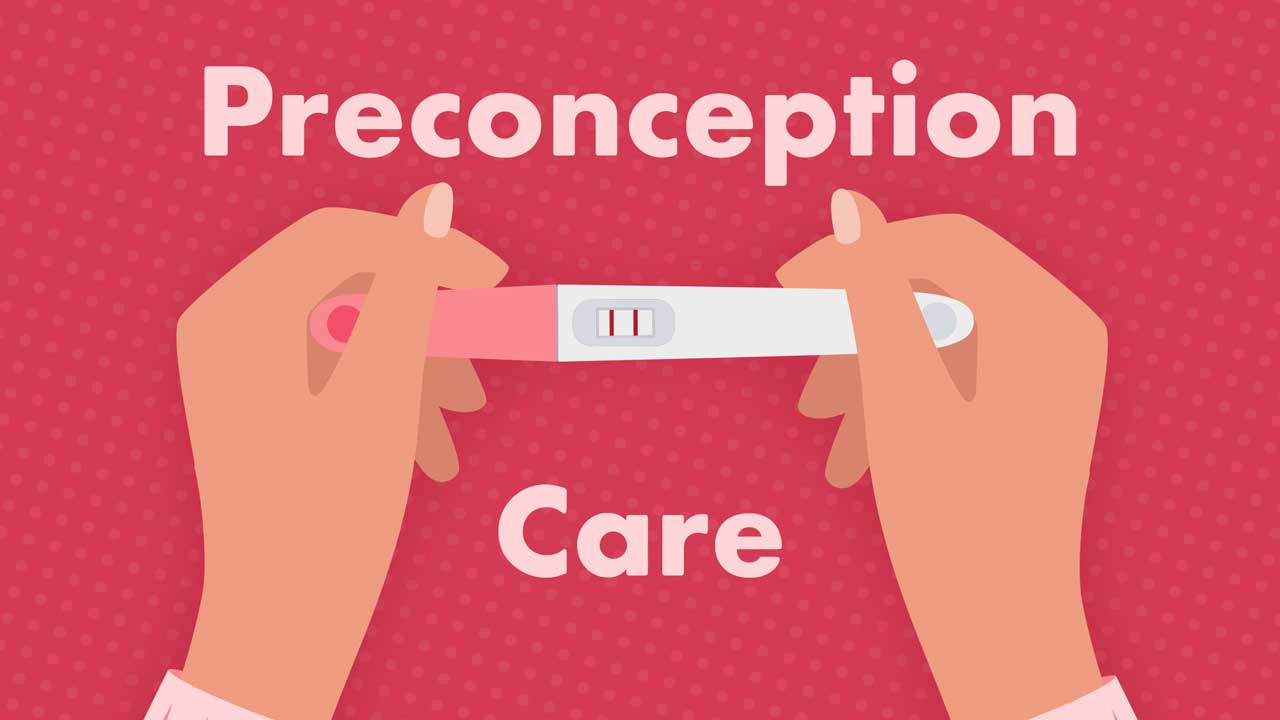Preconception care offers both parents the opportunity to maximise their wellbeing before pregnancy.
Although mainly focused on optimising good nutrition, pre-pregnancy care also includes counselling and the provision of biomedical, behavioural and social health interventions, giving couples the opportunity to optimise pregnancy outcomes (Dorney & Black 2018).
Improving wellbeing before conception has the potential to offer a significant return in terms of avoiding problems during pregnancy. However, many people don’t even realise they are pregnant until the fifth week of pregnancy when many essential fetal developments are already taking place.
As Temel et al. (2013) note, waiting until the first antenatal visit to give advice is simply too late to address many perinatal risk factors. Even though preconception care can be a challenging service to deliver, it can offer significant returns in terms of maternal, fetal and infant wellbeing.
Reaching Those at Risk

Despite the importance of the preconception period, those planning a pregnancy are a diverse and difficult population to reach. Healthy young people have little need for medical care before getting pregnant and may have little awareness of the importance of preconception care. Yet, young women of reproductive age are the population group at highest risk of obesity, suboptimal lifestyle behaviours and related reproductive, metabolic and psychological complications (Khan et al. 2019).
One of the greatest challenges is that relatively few people feel that physical health checks and screening procedures are necessary if they are not already pregnant. This may be due to difficulty obtaining good quality information, as well as a general lack of awareness that health screening is readily available.
However, as Farahi and Zolotor (2013) suggest, given that nearly half of pregnancies are unintended (UNFPA 2022), it may be helpful to offer preconception care as an integral part of primary care for those of reproductive age. Common issues that could be helpfully addressed include:
- Family planning
- Achieving a healthy body weight
- Screening and treatment for infectious diseases
- Updating appropriate immunisations
- Reviewing medications for teratogenic effects.
Control of chronic diseases is also essential for optimising pregnancy outcomes. As Fleming et al. (2018) suggest, the following four disease risk factors should ideally be addressed before conception:
- Maternal overnutrition and obesity
- Maternal undernutrition
- Related paternal factors
- The use of assisted reproductive treatment.
To help raise awareness of the benefits of preconception care and reach a larger number of people, Braspenningx et al. (2013) suggest using a screening questionnaire. This could be a very efficient way to offer pre-pregnancy care, especially where primary care services are under-resourced, or there is a lack of knowledge amongst caregivers. Whilst completing a questionnaire can’t replace the value of a face-to-face consultation, it can save time and help the practitioner focus on the areas of most importance.
Some populations such as multiparous people and those of lower socioeconomic status are known to be much less likely to change lifestyle behaviours before conception. As Goossens et al. (2018) suggest, strategies to promote pre-pregnancy health for these people may need to be tailored more specifically to their needs in order to overcome any barriers to change. For example, it may be easier to gain the attention of these people through non-medical channels, such as schools or other community organisations.
Evaluating the Research
There is now overwhelming evidence that health status before pregnancy can profoundly affect maternal and child health for generations to come (Stephenson et al. 2018). Awareness of this research and how to implement it still remains relatively sparse even though it’s vital to inform and guide targeted health communication.
Temel et al. (2013) suggest that there are relatively few core interventions for which there is significant evidence of effectiveness in the preconception period. For example:
- Alcohol: Although the dangers of fetal alcohol syndrome are well-recognised, there is little research-based evidence on interventions to reduce alcohol consumption in the preconception period.
- Nutrition: Preconception interventions are known to be effective in terms of dietary change and birth weight.
- Smoking: Pre-pregnancy interventions can help achieve smoking reduction before conception.
- Folic acid: There is evidence that interventions to increase folic acid use can improve pregnancy outcomes.
Out of all of these interventions, the use of folic acid has been the most widely studied, while exposure to harmful environmental substances, stress and sleep have been largely neglected. Similarly, even though there is strong evidence for the importance of men's health during the preconception period, only 11% of all studies included male participants (Toivonen et al. 2017).

Getting the Message Across
Even though pre-pregnancy planning has many known advantages, some researchers suggest that a significant negative effect could be the medicalisation of pregnancy. For example, strict rules about quitting smoking, losing weight and minimising alcohol consumption could lead to unhelpful feelings of failure before pregnancy is even established (Braspenningx et al. 2013).
Inability to easily access reliable and consistent information is also a barrier, especially in more vulnerable populations such as those of socioeconomic disadvantage, those of lower health literacy and culturally and linguistically diverse populations.
If preconception health campaigns are to be successful, there is a need for consistent, simple, evidence-based information to become more widely available, with information targeted to different populations via broad-reaching and innovative health campaigns.
In order to help spread the message in a positive way, Public Health England (2018) suggest the following key steps are necessary:
- Raising awareness via information campaigns
- Developing training tools and resources for frontline professionals to help deliver preconception care
- Embedding preconception into existing care pathways
- Evaluating the impact of services and interventions to help build the evidence base
- Developing preconception indicators and improving the quality and completeness of information gathered at antenatal booking
- Addressing wider factors such as the impact of housing, education, working environments and income.
Braspenningx et al. (2013) summarise many of the opinions on preconception care by noting that a positive attitude towards pre-pregnancy care doesn’t necessarily mean that patients are willing to change any unhealthy behaviours.
As Stephenson et al. (2018) suggest, as well as continued efforts to reduce smoking, alcohol consumption and obesity in the population, there also needs to be a greater awareness amongst healthcare professionals about how those who are planning a pregnancy can be encouraged to improve their health.
Conclusion
Pregnancy has aptly been called a ‘window of opportunity’ to improve health outcomes, yet there is also an argument that interventions focusing solely on the time surrounding pregnancy can be too narrow, potentially stigmatising and therefore ultimately ineffective (Hemsing et al. 2017).
Topics
References
- Braspenningx, S, Haagdorens, M, Blaumeiser, B, Jacquemyn, Y & Mortier, G 2013, 'Preconceptional Care: A Systematic Review of the Current Situation and Recommendations for the Future', Facts Views Vis Obgyn., vol. 5 no. 1, viewed 12 September 2023, https://www.ncbi.nlm.nih.gov/pmc/articles/PMC3987351/
- Dorney, E & Black, K 2018, 'Preconception Care', Australian Journal of General Practice, vol. 47 no. 7, viewed 12 September 2023, https://www1.racgp.org.au/ajgp/2018/july/preconception-care
- Farahi, N & Zolotor, A 2013, 'Recommendations for Preconception Counselling and Care', Am Fam Physician., vol. 88 no. 8, viewed 12 September 2023, https://pubmed.ncbi.nlm.nih.gov/24364570/
- Fleming, T et al. 2018, 'Origins of Lifetime Health Around the Time of Conception: Causes and Consequences', The Lancet, vol. 91 no. 10132, viewed 12 September 2023, https://www.thelancet.com/journals/lancet/article/PIIS0140-6736(18)30312-X/fulltext
- Goossens, J, Beeckman, D, Van Hecke, A, Delbaere, I & Verhaeghe, S 2018, 'Preconception Lifestyle Changes in Women With Planned Pregnancies', Midwifery, vol. 56, viewed 12 September 2023, https://www.sciencedirect.com/science/article/abs/pii/S0266613817302619?via%3Dihub
- Hemsing, N, Greaves, L & Poole, N 2017, 'Preconception Health Care Interventions: A Scoping Review', Sexual & Reproductive Healthcare, vol. 14, viewed 12 September 2023, https://www.sciencedirect.com/science/article/pii/S1877575617300940?via%3Dihub
- Khan, N, Boyle, J, Lang, A & Harrison, C 2019, 'Preconception Health Attitudes and Behaviours of Women: A Qualitative Investigation', Nutrients, vol. 11 no. 7, viewed 12 September 2023, https://www.ncbi.nlm.nih.gov/pmc/articles/PMC6682867/
- Public Health England 2018, Making The Case For Preconception Care, Department of Health and Social Care, viewed 12 September 2023, https://assets.publishing.service.gov.uk/government/uploads/system/uploads/attachment_data/file/729018/Making_the_case_for_preconception_care.pdf
- Stephenson, J et al. 2018, 'Before the Beginning: Nutrition and Lifestyle in the Preconception Period and its Importance for Future Health', The Lancet, vol. 391 no. 10132, viewed 12 September 2023, https://www.thelancet.com/journals/lancet/article/PIIS0140-6736(18)30311-8/fulltext
- Temel, S, van Voorst, S, Jack, B, Denktaş, S & Steegers, E 2013, 'Evidence-Based Preconceptional Lifestyle Interventions', Epidemiologic Reviews, vol. 36 no. 1, viewed 12 September 2023, https://academic.oup.com/epirev/article/36/1/19/563788
- Toivonen, K, Oinonen, K & Duchene, K 2017, 'Preconception Health Behaviours: A Scoping Review', Preventive Medicine, vol. 96, viewed 12 September 2023, https://www.sciencedirect.com/science/article/abs/pii/S0091743516303784?via%3Dihub
- United Nations Population Fund 2022, Nearly Half Of All Pregnancies Are Unintended—A Global Crisis, Says New UNFPA Report, UNFPA, viewed 12 September 2023, https://www.unfpa.org/press/nearly-half-all-pregnancies-are-unintended-global-crisis-says-new-unfpa-report

